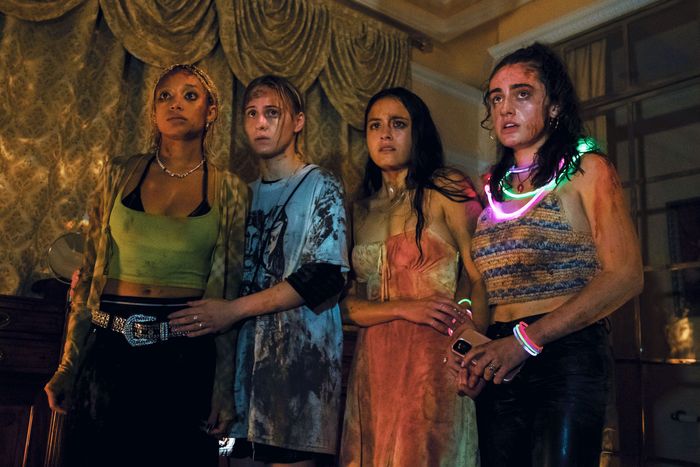
Bodies Bodies Bodies is a slasher movie that opens with a social situation scarier than any gruesome death. Bee (played by Borat Subsequent Moviefilm breakout star Maria Bakalova) is driving with her girlfriend, Sophie (Amandla Stenberg), to festivities being held at the family home of one of her childhood friends. The early warning signs come fast and furious — the relationship is only six weeks old, Sophie is fresh out of rehab and quick with declarations of love, the family home is actually a mansion, the gathering is a hurricane party where everyone will be sealed in by the storm, and none of the attendees were informed that Sophie was coming, let alone bringing someone. But what really sends a chill down the spine is the line Sophie tosses off as Bee looks over the social-media accounts of the people she’ll be meeting shortly. “They’re not as nihilistic as they look on the internet,” she insists.
That’s a threat pretending to be a reassurance, though what it actually turns out to be is a promise that Bodies Bodies Bodies isn’t able to fulfill. The film, which was directed by Dutch actor and filmmaker Halina Reijn and written by Sarah DeLappe and Kristen Roupenian (of “Cat Person” fame), is a diverting affair that aspires to the label of “savage” without actually earning it. It gathers the hippest ensemble of the year — Stenberg and Bakalova are joined by Pete Davidson, Industry’s Myha’la Herrold, Lee Pace, Shiva Baby star Rachel Sennott, and Chase Sui Wonders — to play an ensemble of wealthy nightmare 20-somethings (and one 40-ish Tinder find). But the appeal of the cast can’t change the fact that its members are playing incredibly soft targets instead of real characters. When the corpses start piling up, there’s nothing to be felt aside from mild anticipation as to who’ll turn out to be behind the violence, though it’s also hard not to see the final reveal coming.
The house, which is remote while seeming to be within driving distance of New York City, belongs to David (Davidson), a coke-snorting string bean whom Sophie says was her preschool boyfriend before she figured out she was gay. David is swaddled in family money, and many of the other characters have pursuits instead of jobs. David’s finicky girlfriend, Emma (Wonders), is an actor whose main credit is appearing in a production of Hedda Gabler. Alice (Sennott) hosts a dubious podcast, while everyone seems to have decided her strapping older boyfriend, Greg (Pace), was in the military, though their relationship is even newer than Bee and Sophie’s. The intermittently hostile Jordan (Herrold) prides herself on being the only one of the friend group to not come from money, though in one of the movie’s better moments, she’s taunted for being upper-middle class. Bee, meanwhile, works at a video-game store, and the social gap between her and the people she’s surrounded by is very noticeable.
But the situation might be more uncomfortable if Bakalova were a little better; as the audience surrogate, she ends up being the film’s weak spot, making Bee intensely internal without doing enough to convey her discomfort and desperate desire to be liked. As the untrustworthy Sophie, Stenberg fares a lot better, glowing bright as the sun, then turning all that inviting attention away. The more information the movie drips out about Sophie, the more clear it is that Bee would be smart to put as much distance between her and her girlfriend as possible, but the hurricane makes sure these people have nowhere to go but the rambling halls of David’s cavernous place. Reijn makes the most of the location, wandering through its rooms and hallways once the lights are turned off to facilitate some party shenanigans, with glow-in-the-dark accessories and iPhone lights and an old-fashioned lantern all hovering in the sudden blackness. But when the storm knocks the power out for good and one of their number turns up dead, these people who don’t actually like one another all that much start turning on one another.
There’s a game the characters play before they start the one in the title (which is better known as Mafia or Werewolf), and it involves going around in a circle and getting slapped by the person on your left before doing a shot. It’s a physical re-creation of the cruelties they all subject one another to in the name of having a good time, though the insults — first veiled, then open — they sling around are never as pointed as they should be. When the partygoers rant about how the word gaslighting has been rendered meaningless, or howl about being silenced, or yell about how toxic or ableist someone is being, the movie doesn’t feel like it’s satirizing the privilege of its characters, or the way that academic- and therapyspeak has crept into everyday language. It just feels like it’s being written by Twitter itself, the characters channeling modern social-media dysfunction without anything to delineate them. No wonder it’s hard to care when they start getting killed — it’s a relief more than anything else.
More Movie Reviews
- The Accountant 2 Can Not Be Taken Seriously
- Another Simple Favor Is So Fun, Until It Gets So Dumb
- Errol Morris Has Been Sucked Into the Gaping Maw of True Crime


